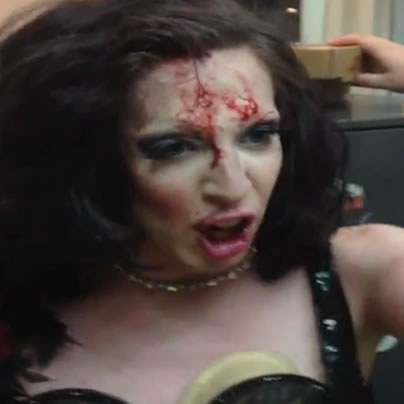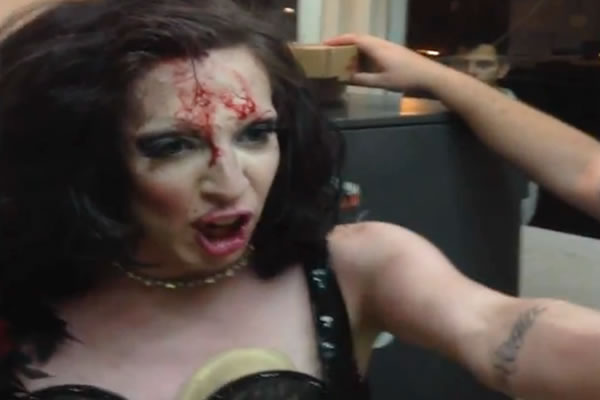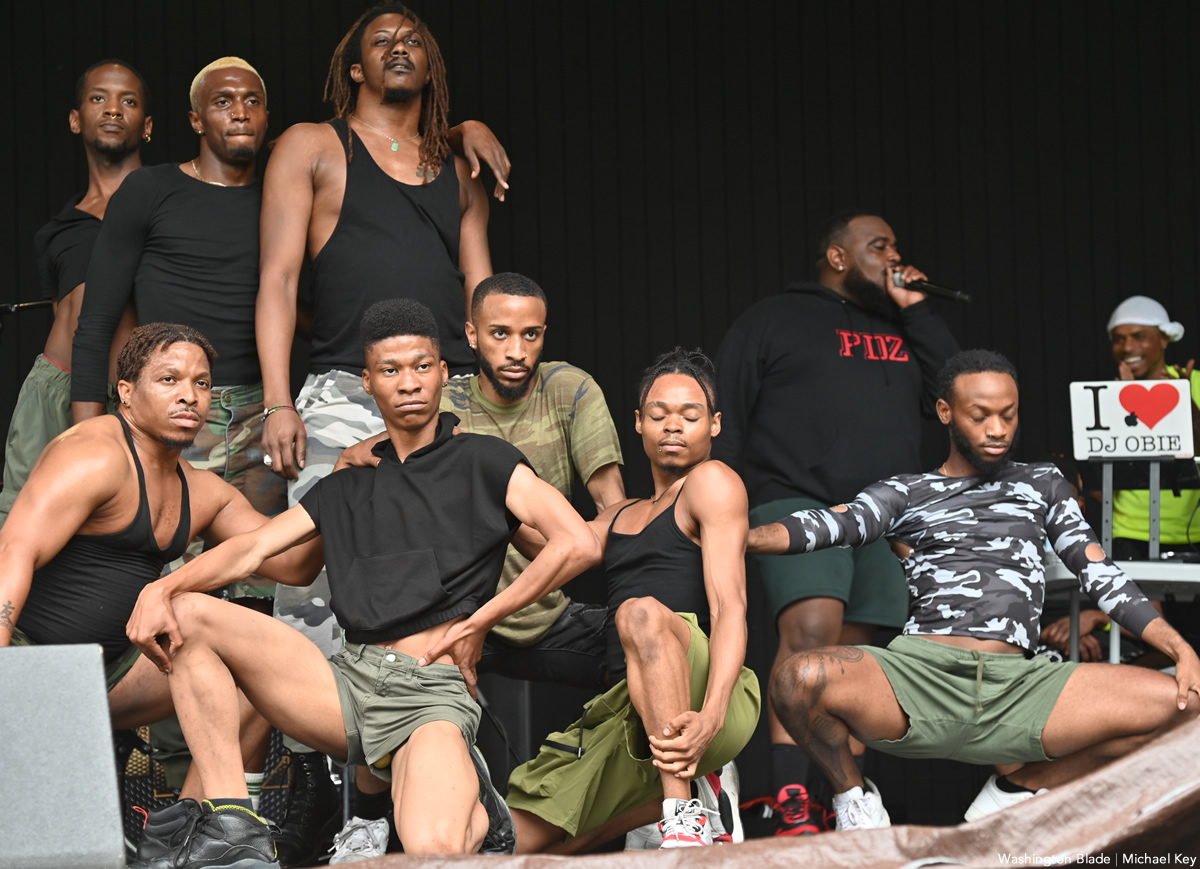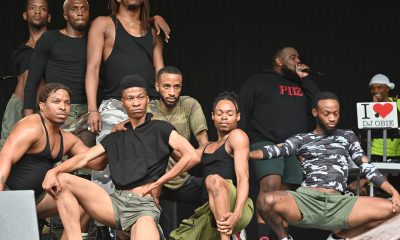Local
Attacker says drag performer threatened to give her AIDS
D.C. police take conflicting reports over attack captured on video


Miles Denaro, 24, says he was attacked by two women who called him a ‘tranny’ and ‘faggot.’ (Screen capture)
One of two women shown in a video posted online punching and kicking a gay male drag performer while pulling him by his hair inside a D.C. carryout restaurant has filed a police report accusing the man of biting her leg and telling her “now you have AIDS.”
The report given by the woman, which D.C. police made public Tuesday afternoon, was the latest development stemming from an incident early Sunday morning, June 23, at Manny & Olga’s pizzeria on 14th Street, N.W., in which Miles Denaro, 24, says he was attacked by two women who called him a “tranny” and “faggot.”
Denaro said he bit the women in self-defense but denies he ever told her she had or would get AIDS.
He said he came to the restaurant to take out food shortly after he performed under his drag name Heidi Glum at the Black Cat nightclub located on the same block as Manny & Olga’s. He was in drag when he entered the restaurant.
The video shows the two women hitting Denaro with their fists while dragging him by his hair across the floor of the restaurant as bystanders, including a man taking the video, laughed and cheered.
According to Denaro, no one, including about six Manny & Olga employees, came to his aid during the assault.
Denaro said he chose not to call police at the time of the assault. He filed a separate police report on Monday, June 24, accusing the two women of assaulting him. He told the Blade the assault began after one of the women made fun of his makeup and words were exchanged between them, prompting one of the women to slap him in the face twice.
“Then I flipped out,” he said. “I spit in her face and her friend jumped in and they started dragging me around by my hair while punching me in the face repeatedly and kicking me,” he said.
He initially identified himself to the media as Miles DeNiro. When asked by the Blade why the police report spelled his last name as Denaro, he said he has used “DeNiro” as a stage name and that his legal birth name is Denaro.
The police report taken from the woman, who is identified as Rachel Manna Sahle, 22, of Gaithersburg, Md., classifies her biting allegation against Denaro as a felony aggravated assault that carries a maximum sentence of 10 years in jail.
The police report taken from Denaro classifies the assault by the two women against him as a misdemeanor simple assault, which has a maximum sentence of six months in jail and/or a fine of $1,000.
Police spokesperson Gwendolyn Crump said police would have no comment on any details of the case because it remains under investigation. No arrests had been made in the case as of Wednesday.
It couldn’t immediately be determined why the police reports classified the woman’s allegation as a more serious offense than Denaro’s complaint – which is backed up by the video – that the two women injured him in a violent attack.
Denaro told the Blade he did, in fact, bite Sahle on her leg but said he did so in self-defense in a desperate attempt to get her to stop pulling out his hair. He denies telling her she had or would get AIDS.
“She was ripping my hair out,” he said. “I have a bag full of my own hair that I picked up off the floor. She ripped my hair out repeatedly. There was nothing I could do to get her off of me because the other girl was on top of me and she was really huge.”
Added Denaro, “At that time, with my face on the ground in her legs, the only thing to help get out of it was to bite her. It didn’t draw any blood. I don’t think I broke the skin. I just bit her hard enough so that she would let go of me. And it worked. She did.”
The police report of Sahle’s allegation against Denaro says Sahle gave a different version of what happened from that of Denaro.
The report says Sahle told police Denaro “became verbally combative” with her at the restaurant. It says Sahle claims that after she and Denaro exchanged words “several people began to fight inside the establishment.” During that altercation, Denaro “bent down and bit Complainant 1 [Sahle] on the right thigh.”
It says that shortly after biting her Denaro stated, “That’s why I bit you, now you have AIDS, bitch.”
Based on the conflicting statements made by Denaro and Sahle, police investigators and prosecutors from the U.S. Attorney’s office will have to decide who to believe and who to charge with a possible crime such as assault.
Denaro told the Blade that he is HIV positive. The video shows him shouting at the other woman who assaulted him that she would get AIDS as he wiped blood dripping over his face. He said the blood came from two head wounds he sustained when the women knocked him down and his head hit the floor.
“I was doing what I thought was the responsible thing to do – to tell the girl I’m positive,” he said.
The police report taken from Denaro says Denaro told police that the two women started the altercation when one of them criticized his makeup and started touching his face. The report taken from Denaro contradicts the report taken from Sahle by saying the altercation was limited to Denaro and the two women.
District of Columbia
Reenactment of first gay rights picket at White House draws interest of tourists
LGBTQ activists carry signs from historic 1965 protest

About 30 LGBTQ activists formed a circular picket line in front of the White House Wednesday afternoon, April 17, carrying signs calling for an end to discrimination against “homosexuals” in a reenactment of the first gay rights protest at the White House that took place 59 years earlier on April 17, 1965.
Crowds of tourists looked on with interest as the activists walked back and forth in silence in front of the White House fence on Pennsylvania Avenue. Like the 1965 event, several of the men were dressed in suits and ties and the women in dresses in keeping with a 1960s era dress code policy for protests of the Mattachine Society of Washington, D.C., the city’s first gay rights group that organized the 1965 event.
Wednesday’s reenactment was organized by D.C.’s Rainbow History Project, which made it clear that the event was not intended as a protest against President Joe Biden and his administration, which the group praised as a strong supporter of LGBTQ rights.
“I think this was an amazing event,” said Vincent Slatt, the Rainbow History Project official who led efforts to put on the event. “We had twice as many that we had hoped for that came today,” he said.
“It was so great to see a reenactment and so great to see how far we’ve come,” Slatt said. “And also, the acknowledgement of what else we still need to do.”
Slatt said participants in the event who were not carrying picket signs handed out literature explaining the purpose of the event.
A flier handed out by participants noted that among the demands of the protesters at the 1965 event were to end the ban on homosexuals from working in the federal government, an end to the ban on gays serving in the military, an end to the denial of security clearances for gays, and an end of the government’s refusal to meet with the LGBTQ community.
“The other thing that I think is really, really moving is some of the gay staff inside the White House found out this was happening and came out to greet us,” Slatt said. He noted that this highlighted how much has changed since 1965, when then President Lyndon Johnson’s White House refused to respond to a letter sent to Johnson from the Mattachine Society explaining its grievances.
“So now to have gay people in the White House coming out to give us their respects and to say hello was especially meaningful to us,” Slatt said. “That was not expected today.”
Among those walking the picket line was longtime D.C. LGBTQ rights advocate Paul Kuntzler, who is the only known surviving person who was among the White House picketers at the April 1965 event. Kuntzler said he proudly carried a newly printed version of the sign at Wednesday’s reenactment event that he carried during the 1965 protest. It stated, “Fifteen Million Homosexuals Protest Federal Treatment.”
Also participating in the event was Japer Bowles, director of D.C. Mayor Muriel Bowser’s Office of LGBTQ Affairs. Bowles presented Slatt with a proclamation issued by Bowser declaring April 17, 2024, Mattachine Society Day in Washington, D.C.
“Whereas, on April 17, 1965, the Mattachine Society of Washington courageously held the nation’s inaugural picket for gay rights, a seminal moment in the ongoing struggle for LGBTQIA+ equality in the United States, marking the genesis of public demonstrations advocating for those rights and paving the way for Pride Marches and Pride celebrations worldwide,” the proclamation states.
About 30 minutes after the reenactment event began, uniformed Secret Service agents informed Slatt that due to a security issue the picketers would have to move off the sidewalk in front of the White House and resume the picketing across the street on the sidewalk in front of Lafayette Park. When asked by the Washington Blade what the security issue was about, one of the Secret Service officers said he did not have any further details other than that his superiors informed him that the White House sidewalk would have to be temporarily cleared of all people.
Participants in the event quickly resumed their picket line on the sidewalk in front of Lafayette Park for another 30 minutes or so in keeping with the 1965 picketing event, which lasted for one hour, from 4:20 p.m. to 5:20 p.m., according to Rainbow History Project’s research into the 1965 event.
Although the LGBTQ picketers continued their procession in silence, a separate protest in Lafayette Park a short distance from the LGBTQ picketers included speakers shouting through amplified speakers. The protest was against the government of Saudi Arabia and organized by a Muslim group called Al Baqee Organization.
A statement released by the Rainbow History Project says the reenactment event, among other things, was a tribute to D.C.-area lesbian rights advocate Lilli Vincenz, who participated in the 1965 White House picketing, and D.C. gay rights pioneer Frank Kameny, who founded the Mattachine Society of Washington in the early 1960s and was the lead organizer of the 1965 White House protest. Kameny died in 2011 and Vincenz died in 2023.
The picket signs carried by participants in the reenactment event, which were reproduced from the 1965 event, had these messages:
• “DISCRIMINATION Against Homosexuals is as immoral as Discrimination Against Negroes and Jews;”
• “Government Should Combat Prejudice NOT PROMOTE IT”
• “White House Refuses Replies to Our Letters, AFRAID OF US?
• “HOMOSEXUALS Died for their Country, Too”
• “First Class Citizenship for HOMOSEXUALS”
• “Sexual Preference is Irrelevant to Employment”
• “Fifteen Million U.S. Homosexuals Protest Federal Treatment”
District of Columbia
Organizers announce details for D.C. Black Pride 2024
Most events to take place Memorial Day weekend at Westin Downtown

The Center for Black Equity, the organizer of D.C. Black Pride, the nation’s first and one of the largest annual African-American LGBTQ Pride celebrations, announced this year’s event will take place Memorial Day Weekend from May 24-27.
The announcement, released April 16, says that most 2024 D.C. Black Pride events will take place at the Westin Washington, D.C. Downtown Hotel at 999 9th St, N.W.
“With the theme Black Pride Forever, the event promises a weekend filled with vibrant celebrations, empowering workshops, and a deep exploration of Black LGBTQIA+ history and culture,” the announcement says.
It says events will include as in past years a “Rainbow Row” vendor expo at the hotel featuring “organizations and vendors created for and by the LGBTQIA+ community” offering products and services “that celebrate Black excellence.”
According to the announcement, other events include a Health and Wellness Festival that will offer workshops, demonstrations, and activities focused on “holistic well-being;” a Mary Bowman Poetry Slam “showcasing the power and beauty of spoken word by Black LGBTQIA+ artists;” the Black Pride Through the Decades Party, that will celebrate the “rich history of the Black LGBTQIA+ movement;” and an Empowerment Through Knowledge series of workshops that “delve into various topics relevant to the Black LGBTQIA+ community.”
Also, as in past years, this year’s D.C. Black Pride will feature its “Opening Night Extravaganza” reception and party that will include entertainment and live performances.
The announcement notes that D.C.’s annual Black Pride celebration, started in 1991 as a one-day outdoor event at Howard University’s Banneker Field, has inspired annual Black LGBTQ Pride events across the United States and in Canada, United Kingdom, Brazil, Africa, and the Caribbean. More than 300,000 people attend Black LGBTQ Pride events each year worldwide, the announcement says.
Full details, including the official schedule of events, can be accessed at dcblackpride.org.
District of Columbia
Trans woman files bias complaint against D.C. homeless shelter
Says staff forced her to stay in male sleeping section

A transgender woman has filed a discrimination complaint with the D.C. Office of Human Rights charging that officials with the Community for Creative Non-Violence homeless shelter refused to allow her to stay in the women’s section of the shelter, forcing her to stay in the men’s sleeping section.
The shelter, located at 425 2nd St., N.W., is one of the city’s largest privately operated homeless services facilities organized by the Community for Creative Non-Violence, which is known as CCNV. It was founded by nationally acclaimed homeless services advocate Mitch Snyder, who passed away in 1990.
The complaint, filed last week by Stephon “Lashawn” Jordan, states that Jordan and a cisgender female friend arrived at the CCNV shelter around 2:30 a.m. on March 22 after they obtained a ride to the shelter through the city’s Emergency Shelter Hotline.
“Upon arrival we were informed that we would have to complete an intake once upstairs at the female housing unit,” Jordan states in the complaint. “Once we arrived a staff member came out. The staff member stated to me that we don’t house transgender individuals in this unit and that I would have to go down to the male shelter unit,” the complaint says.
It says Jordan’s female friend told the staff member she was not going to leave her friend, who identifies as female, by herself in another location at the shelter. “The staff member did not want to hear it and said that both of you can go downstairs too,” the complaint says. “Once we got downstairs to the male shelter unit we asked to speak with a supervisor,” it says.
“Someone came, but the decision was that myself and my friend could go and sleep in the male housing unit,” the complaint states. “During our stay it was very humiliating especially using the restroom,” it concludes.
A spokesperson for the CCNV shelter did not immediately respond to a phone and email message left by the Washington Blade asking for a response to the complaint.
Transgender rights advocates, including D.C. trans activist Earline Budd, who assisted Jordan in filing the complaint, have said the denial of placement of a transgender woman in the female section of a place of public accommodation such as a homeless shelter is a violation of the D.C. Human Rights Act’s ban on gender identity discrimination.
The Office of Human Rights website explains that under its policy for responding to discrimination complaints, the complainant and the accused party are required to enter mediation to determine if the complaint can be resolved. If the mediation fails, the OHR website statement says, a full investigation is conducted that can take up to six months to complete. It says upon completion of the investigation, the office makes a determination of whether probable cause exists that discrimination occurred.
If probable cause is found, the case is sent to the D.C. Commission on Human Rights, which holds a public evidentiary hearing with witnesses before making a final decision on whether discrimination occurred.
-

 Africa3 days ago
Africa3 days agoCongolese lawmaker introduces anti-homosexuality bill
-

 World4 days ago
World4 days agoOut in the World: LGBTQ news from Europe and Asia
-

 District of Columbia3 days ago
District of Columbia3 days agoReenactment of first gay rights picket at White House set for April 17
-

 Africa3 days ago
Africa3 days agoUgandan activists appeal ruling that upheld Anti-Homosexuality Act












